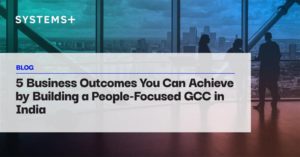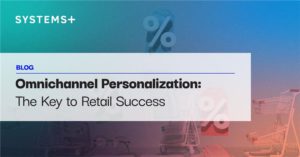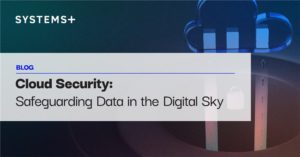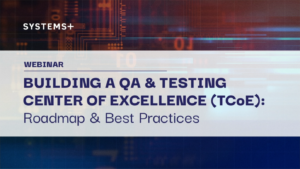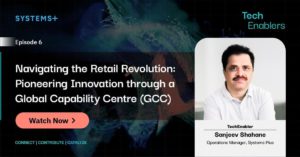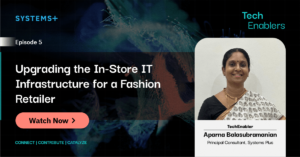Amay (00:00.)
Hey everyone and welcome to Enabling Digital with Systems Plus. I'd like to welcome Robin to the podcast today. Robin, welcome. Could you first just tell us about your career, not just at Databricks and Microsoft and some of the amazing things you're doing with Chief, if I'm saying that correctly, and women leaders in data and AI.
Robin Sutara (00:24)
Yeah, thank you so much for having me. I mean, I'm super excited to be here and have this conversation. So, Robin Sutara, I'm currently a field CTO with Databricks. What that essentially means is I have the honour of working with many, many customers around the world as they are trying to actually execute and implement their data and AI strategy. We know oftentimes that comes down to not just a great technology platform, which Databricks has, and we can talk about a little bit later, but also, the people, process, change management, execution at scale. One of the reasons I joined Databricks about 18 months ago was prior to that I spent 23 years with Microsoft, helping Microsoft on their digital and data transformation and journey, which I think most people can admit has been pretty phenomenal on how they transitioned from a historical sort of legacy organization focused on PCs and desktops to the cloud -based services and Satya and the organization has done a phenomenal job there. And I was really honoured to be part of that transformation and part of that journey internally. And so, it's a lot of what I do at Databricks now is all of the lessons learned at Microsoft. How can I help organizations leverage Databricks technologies to be able to deliver on that type of transformation and success?
And as you mentioned, I have my day job with Databricks, but in my spare time, I like to focus on things and organizations that are really focused on driving diversity, particularly in the data space and technology space. I think it's more opportunity than ever for us to think about introducing different backgrounds, different cultures, etc, into data teams. It's a great opportunity that to bring different backgrounds, not just your traditional STEM or science, technology, engineering, mathematics, but can you also bring things like arts and drama and history and languages and all of those things I think can bring a pretty significant value in the data space. And so, the organizations that I participate in outside of my regular job tend to focus on bringing female talent into the workforce.
Robin Sutara (02:32)
So, Chief is primarily, was expanding into the UK and they were primarily focused at the C level, the C suite level and getting more gender diversity representation across executives and boards. And then other organizations like Women in Data and Women Leaders in Data and AI are focused specifically on data and technology and getting more.
Female representation across every level of data roles. And so really thinking about, you know, how do we make sure that our teams are diverse enough and have gender representation so that we can make sure things like data biases, etc., don't continue to propagate across the ecosystem.
Amay (03:21)
And I heard from one of your earlier podcasts, and we'll get into this later, something just around seat belts, right? And how seat belts were designed with, I think males as the primary measurement candidate and females were just ignored because they were designed way back when.
And I will get into that a little later in the podcast, but I thought that was a really cool little anecdote that I heard earlier, that you heard earlier speak about. So now you were at Microsoft at probably the best time to be at Microsoft, right? With Satya kind of taking over and really driving transformation from the traditional PC business to Azure and the cloud. And what, I mean, I guess over that span of time, how has data played a role? How has data evolved? And of course we know data has reached a very pivotal and critical moment today. But what have been the observations over the years?
Robin Sutara (04:16)
Yeah, I think for every organization data has definitely been an evolution. I remember the early days of data. One of my first data roles at Microsoft was I managed a team of analysts and we looked at internal and external data sources to make recommendations on internal Microsoft processes that we would potentially change. So, you write, should we change our billing model? Should we?
Do we have feedback on the product? Should we change how we do account team coverage against our customer base, et cetera? And it was really interesting in those early days, it was strictly about backward looking reporting. We would sort of share the data. And I remember having one executive give me feedback like, that's great, I appreciate what the data says, but I want the data to say, or I want a report that helps me with this position or this argument. And so, then it was sort of like,
Okay, I really started to learn that data could be, you know, when you're just doing reporting or backward looking, you could really just sort of filter and slice it and deliver whatever message that you are trying to resonate and find data. I think that the evolution that we have seen many organizations go on is how do you now become preventative? How do you become more proactive leveraging your data? How do you become more forward looking and deliver sort of better services for customers or citizens, right? In a way that's not just reacting or reporting what happened. And I think that's the true evolution of AI, which is why I think Databricks is such a phenomenal sort of company to work for, because they really are on that leading edge of how do you leverage your foundations that you have built out over the last couple of decades in your data platform? And now how do you really unlock the power of that to deliver?
Robin Sutara (06:05)
AI solutions, not just generative AI, but AI in general, right, to become more predictive and preventative and help prevent issues before they ever occur.
Amay (06:17)
And so, you mentioned with Databricks, you guys are doing that today. Now Databricks does a lot of different things. We've also seen the evolution of infrastructure with the cloud coming in, data infrastructure as well, compute. You can now compute. I remember Query's probably a few years ago used to take maybe two, three, four days to run and can now run in seconds, which is a big enabler for data teams. What are some of the core problems you're solving with clients at Databricks today?
There's the lake house, which you're a pioneer of, but you know, other than that, what else are some of the things you're working on?
Robin Sutara (06:55)
Yeah, so we're super excited, I think, about the direction that Databricks is going. As you mentioned, we're the pioneers of the lake house. The company's been around for a little more than 10 years, originally started as the, from the founders, we're academics out of UC Berkeley, started with the creation of Spark. So, they really were focused on AI from the very beginning, the big data issues that organizations were running into. And you're right, sort of creating that lake house. How do you have a single translation layer that allows you to do BI and AI out of your traditional warehouse as well as your lake. Now what we're seeing is sort of with this evolution and gen AI revolution, I guess, that people are talking about is really how do you start to think about democratization of data and AI? So, what we have done with the acquisition of Mosaic ML that happened about a year ago, we have now integrated that into the platform.
And there's a couple of ways that that benefits our customers. The first is what we've introduced is the data intelligence engine, which is essentially a layer that sits on top of the cataloguing. So, you have Delta Lake, which allows you to actually base on Parquet filter against the lake and the warehouse. You have Unity that manages lineage from end to end on your data, as well as your AI assets. And now we have this intelligence engine built on top. So essentially that is running AI on your environment to help you do things like data tagging, business semantics, data definition, query optimization, text to SQL and assistance type of functionality. So, we're building all of that into the data intelligence platform. That's all built on the foundations of Lakehouse. So really, really excited to see what that can help organizations do like. By building AI directly into the data platform, how they can really deliver faster, right? And really sort of, because, you know, as we were talking about earlier, there are a limited number of resources across the data ecosystem to be able to deliver all of this work. So how can we make the platform smarter so that your limited resources can be more effective and efficient at the work that they're delivering? And then lots of customers are asking us, how do we do our own generative AI? How do we build our own large language models?
Um, particularly because we know that the competitive advantage that any organization has is their data, right? Everybody has access to chat GPT. Everybody. I mean, my grandmother even asked me how to use it. Right. So, because she's using the same technology that you are, she has the same advantage that you do. Your advantage is you have some phenomenal data sets that nobody else owns. And so, organizations are really trying to think through how do we build our own models? How do we make sure that our intellectual property remains ours? How do we make sure that we maintain our data and our assets as our own sort of competitive advantage? And that's what we're super excited that based on that data intelligence platform, organizations can now use Databricks and Mosaic AI inside the platform to start to build their own capabilities.
So, leveraging the entire open ecosystem and not have to depend on a single model to solve every use case, because we know that's just not going to happen that way. And how do you do that cost -effect, right? Cost -efficiently, most organizations don't have billions of dollars to invest in sort of scouring the entire internet. And so, I think it's super exciting to see what organizations are actually building that's going to completely revolutionize the way people interact with them and how people receive services in public sector, right, as a citizen as well as commercial and how you shop and buy and interact.
Amay (10:42)
So, I think it's super interesting. You talked about something as basic as data catalogue, data lineage, and the foundation there for the warehouse. And then of course, the whole journey all with the generative AI. And if you want to build your own LLMs on top of that. In your experience as a field CTO, especially when I've worked with finders, your Silicon Valley forward looking tech companies, but then as the rest of the world and corporate America. Where have you seen people to be, are they ready for generative AI and that level, or is it, you know, coming down to the data catalogue and the data lineage and just putting the right data in place so they can do this maybe two, three years from now? What have you seen out on the field with your clients?
Robin Sutara (11:26)
Yeah, I think everybody's at a different sort of maturity on that journey, right? I think there's definitely some organizations are still working on the foundations. Like, can you get your data sets in order to be able to deliver? I think the interesting part is, you know, Microsoft's journey and evolution didn't happen overnight, right? It happened over a period of time. And it was really about tackling specific issues or problems or use cases within the environment. And that's what I try to encourage the clients that I work with as well. Like think about what are the data assets that you already have in place? What's already in the lake house that you can start to build upon? What's the business value or the business use cases that you want to be able to deliver? I'm having so many conversations right now with CEOs and boards and the very first thing they ask is we want to do AI, right? Or I guess that's on an ask, right? That's the very first thing they say is we want to do AI. Like that's great. Like what are you trying to solve with AI? Like what do you want to deliver? What ideas does your organization have that's going to innovate the way that you do business today? Are you going to drive some, you know, net new product or service? Are you going to optimize your operations to reduce your P &L costs? Are you like, there's lots of things that we can do with AI, but let's start with the outcome and the value. Otherwise, it just becomes this shiny toy, and everybody's played with AI and you're like, ooh, we invested a lot of money in that, and we didn't really get any business value out of it. So, start with the business value in place and then you can work your way backwards from there to say, okay, do we have the right platform in place to be able to support that? Do we have the right data foundations in place? Do we have the right internal processes? Have we enabled our people in the right ways to be able to work more efficiently?
Lots of AI has actually changed management in my experience and my view, right? Great platforms, great technologies. Problem is if nobody knows how to use it and nobody uses it, it's not really driving the value of that investment that you made. And so, I think lots of organizations are struggling with that. They see this bright shining toy around chat GPT, and they think, oh, I want to be able to talk to my data in natural language, right? I'm in.
You know, in English or Portuguese or wherever they might be, right? But what they're not thinking about is, okay, what are you going to do if you can do that? Is it just building a chat bot for the CEO? That's very different than, hey, you want to actually put it on top of your data like JetBlue has done some amazing work. There's a public case study out there about how they've actually leveraged generative AI on large language models to aggregate data across weather, maintenance, Flight times, customer bookings, right, sort of staffing of airlines, etc. So that they can better deliver a nicer experience for their clients, for example, when a flight gets cancelled, instead of having to queue up or wait in a line, they can now interact with the in natural language with their systems and be able to rebook themselves and understand the options, etc. And so, there's some great things that you can solve, but you really have to make sure you have those foundations in place. And have you enabled the organization with people in process and change management to really unlock the power of those things that you're creating?
Amay (14:48)
Yeah, and the JetBlue example you just mentioned, right? The Genitive AI is great because it allows that natural interface, but then you're also using that predictive prescriptive AI piece, which you mentioned earlier around, okay, now I have all this data. I know the flights cancel. I know what the next flights are. I know what the next best option might be for this passenger. Instead of letting them come and react, I can proactively say, this is probably what you should do and get ahead of it.
Robin Sutara (15:12)
Exactly. And think what a great experience that is for as a passenger. Like you want that to happen. You don't want to have to sit in a right in a phone queue or the line at the airport for hours trying to get rebooked. So, I think it's absolutely beneficial. But again, they were very clear on the value, the business value that they were going to deliver and sort of the experience for all the parties involved. And how could they get ahead of that? And what data did they already have that was ready for that? You know, how could they enable the people in them.
Their agents within the organization, how did they think about internal processes that they needed to change? And so, I think it's a great example of an organization that thought across all of those aspects and then had the technology to be able to deliver it.
Amay (15:55)
Yeah. And it's funny you mentioned the use cases around generative AI, because you're right, right? The board's asking for it. The CEO is asking for it. And I spoke to the CIO for a large retailer. And I was like, what are you doing with generative AI? And him and his VPs were like, we don't really know what use cases we have. But at the same time, he was giving a presentation to his leadership on generative AI. And I was like, this is confusing. So, I'm not, you know, I don't know if people have really figured out all the use cases yet, but let's say some people have started figuring out the use cases when it comes to then implementing and putting that data strategy in place. What are the roadblocks that you typically find? Where are some of the biggest challenges that you see?
Robin Sutara (16:40)
Yeah, again, I think it comes down to people in process because we tend to gravitate toward the technology when you think about AI, right? And so, people are always thinking about what's the latest and greatest tech that I can put into the platform. I have lots of customer conversations about how do we make sure that we're future proofing your system and then your platforms as much as possible. Regenerative AI is moving faster, I think, than any technology revolution that we've seen in quite a while. And so, because you want to make sure that you're helping organizations not have to rebuild their AI platforms every, you write two to three months as new models come out, et cetera. You want to give them sort of the foundations in place that it can be as open as possible. And that's sort of the perspective that Databricks has taken in this space. But I think organizations, once they built those foundations, once they have that in place, you have to, again, go back to people and process that those changes don't happen within your organization just because you create a, you know, an HR system that allows all of your employees to actually interact with your internal policies so that you can free up your HR partners to focus on development and enablement and all those other things that they just don't have time to deal with because they're answering my question on how much vacation do I have this year? Right. So how do you make sure that you're enabling the entire organization to realize what processes or things are changing as a result of you introducing these new solutions within the organization? Because the whole point is not just to add more complexity to their world, but it is to free up the human capital and intellectual capabilities that they have to solve some of the bigger problems that they just haven't had the time to solve. And so, by creating the tech and then not enabling the people or changing the processes and, and actually working through that in a true structured change management sort of capability. Cause the other thing I see often is they create it and then they throw it over to the business and they say, well, of course they're going to use it. They obviously see the value. And it's like, did you ever train them how to use it? Did you positively and were reinforced? Did you do your communications plan? Like when you start walking through the basics of change management, you see a lot of like, oh yeah, well, we didn't do that. We just thought that they would obviously see the value that they would get, and they would just start using it. It's like, it doesn't quite work that way. So, I think that is the biggest obstacle I see is great tech, great products, data products and services, great AI solutions that you're integrating, but you forget about how to actually do change management and bring people in process along on the journey with you.
Amay (19:18)
And I'm assuming as part of your role at Databricks, that's a big part of what you and your team are doing when you implement these data platforms.
Robin Sutara (19:27)
Absolutely. Yeah. How do we, how do we partner with customers to help them with that? Because I, you're right. Maybe I am super biased here, but I think Databricks has a great platform to be able to help customers do that, right? Do that and be open and future -proof and simplicity and cost savings and all of those great, you know, technical capabilities that our platform has. But how can we also now partner with organizations to help them actually execute against using the great tech that they've invested in built?
Amay (19:54)
Yeah. So, I wanted to shift gears now a little bit because we know we've spoken a lot about sort of your professional career at Databricks, but you've had a very interesting personal journey as well. You are a mother, survivor of domestic abuse, triathlete and of course you're an amazing career and still spanning multiple roles. How has data sort of, has it played a role in your personal life at all? Has it helped you sort of get through managing all of these different things? Like how?
Tell me more, please.
Robin Sutara (20:29)
I think I am completely probably data driven in every aspect of my life, which probably irritates my family to no avail. Right. So, I mean, if I think about, for example, my triathlon training, constantly have my Garmin watch on, right. I'm constantly tracking every metric. How, how much did I sleep? Did I get quality sleep? What are my macros? How am I, right? Am I, if I have a big run coming up, did I eat enough? Did I eat too much? And now I need to worry about.
So it's probably like the worst, uh, the worst thing that any data driven person could ever pick up as a hobby because you could completely get sucked into those. If I could just shave three seconds off my hundred-meter swim time, I would be so much better off. Right. So, uh, Oh my gosh. Yeah, it's horrible. It's horrible. Luckily, I now have a coach that sort of points me in the right direction, but early days, it's definitely easy to get sucked up. I, I mean, I,
Amay (21:14)
Do you have big excels tracking your daily performance?
Robin Sutara (21:26)
I even put together like Excel spreadsheets for family vacations to, you know, right, to predict the temperature so that I can tell everybody how to pack for the, so yeah, I think, I think my family is absolutely like, gosh, stop working in that data stuff, right? But I think the interesting part is data is so prevalent in everybody's life, whether you think about it or not. I constantly try to tell my girls, you know, every time you're in the grocery store and you're mentally calculating how much, Detergent brand A is per ounce compared to detergent brand B and how many loads it's actually going to be able to wash out of the box. That's all data, right? You're just doing it inside your head, but it is data. So, you have to rate data is prevalent in everything that you do. And I think there's a few things that benefits society as a whole is when we think about net new data talent, we always think about, oh, do you know SQL or Python? We never think about. How do you start to open up opportunities? Because everybody uses data in some capacity in their life. And so, what a great way to introduce net new talent that might have a differing background, a different experience, different education, et cetera. Because data is such a silver or golden thread that goes through every aspect of people. Maybe not to the extent, I'm not sure everybody else plots out temperature graphs for family vacations, but people do sort of interact with data on a regular basis. And I think that's what makes it such an amazing, fascinating space to operate in.
Amay (23:02)
And so, the other part which you've mentioned in the past is your superpower, as you've called it, is managing chaos. And now there's so much data. There's data, like you said, everywhere in everything we do. I guess, how do you kind of manage it? How have you stumbled upon this superpower that, okay, I can manage chaos. What can others, what would your advice be to other people looking for their superpower?
Robin Sutara (23:25)
Yeah, so I think I discovered it because being a mother of four girls and trying to have a career and go back to law school and sort of do all of the things that I've done in my lifetime, I think I wouldn't have been able to manage all of that if I hadn't figured out a way that worked for me to sort of manage across all of those aspects. And so, I think the interesting part is as I started to translate between, I realized that my personal life and my work life were not, separate as much as we talk about work -life balance and all of these terminologies that make it seem like they're distinct characteristics of your humanity. They're so intertwined, right, that you can't separate them. And so really thinking about when I went for my first data job, it was all about how do I translate these experiences that I have that may not be because I didn't actually have my undergraduate, I didn't have my bachelor's when I got my first data job. I started as in the US Army of repairing Apache helicopters, doing Hellfire missiles and 50-millimeter machine guns. That's about as far away from somebody who's a traditional computer science degree background could be. But what I started to think about was, you know, what did I learn in those things? What did I learn about being the mother of four? What did I learn as a triathlete? What did I learn as a domestic abuse survivor? What did I learn as a US. Army soldier that I could translate into the skills I think that drive successful data projects or data transformation projects or being able to do analysis and tie together all these disparate data sites? Because like you said, there's so much data. How can you translate those skills into?
Robin Sutara (25:11)
Narrowing it down to actionable outcomes. Like that's sometimes overwhelming for some people. And so that happened to be something that I felt I was really good at. Managing four girl’s calendars when they're all within a 10-year age range of each other, that is not an easy feat, right? And so being able to translate that into, I can take all these disparate data sets and time requirements and necessities and translate it into a single actionable plan for the day. that translates into business. And so, I would encourage people to think about, don't just think about formal education.
Don't just think about your current career path. Think about those skills and attributes that you can bring in that are unique to you. That's what's amazing about it. And I think that's what opens up such great opportunities.
Amay (25:53)
Yeah, and I mean, I think you're absolutely right. Like work -life balance is something people say a lot, but it's quite difficult. I think Jeff Bezos said not work -life balance, but work -life harmony. If you're in a bad mood at home, you're not going to be in a good mood at work. So, you have to have the right harmony between the two. And I think data, like you said, can play an important role. I mean, I don't know how you manage four kids' calendars. I have one and I struggle. But so, the other thing you also mentioned is you didn't have a traditional career path. You got your first job. You didn't have your bachelor's in computer science, as maybe a lot of people would today. So, what would your advice be for people maybe outside of data or for women especially who are in data, maybe outside of data, and they want to get into that space? How can they go about approaching that?
Robin Sutara (26:50)
Yeah, so like we just mentioned, think about the things right between your work life harmony, right? That you can sort of bring in and build those skill sets. But the other thing I would say is look for opportunities in your current role. I find oftentimes you can start to think about how are you using data in your day job? If you're not currently using it in the way that you are, how can you propose some? a new project or new evolution or new business outcome that you think that you could drive that offers you a learning opportunity as well as brings value to the business. More often than not, though, this last half of my career, I've actually defined my own roles, right? And a lot of that has to do with trying to understand some unique value or aspect of the business and then bringing a value proposition or a solution, right? I think lots of people often identify this doesn't work in my job, right? Or this is horrible, or I wish I could, right? So, solve it. Come back with a proposal on how to solve it. How could you use data to solve a problem that nobody else seems to have tackled within your job today? And put that back into the leadership that you want to work on this project, because it offers you the opportunity to learn, and it helps solve that business problem. I the other thing is volunteer, right? We talked earlier on about some of the additional organizations that I belong to outside of my job.
Right? So, find those types of communities, those opportunities, things like, you know, women in data, I think have been phenomenal, but just because it does give you the opportunity to connect across that network, to grow skills and developments in new ways, to find role models, to find mentors, et cetera. So, look in your current job.
Think about those community or outside activities that could start to bring value to you. And then, yeah, I think the other option is always sort of formal education. I remember about halfway through my career, I really thought I was goanna be a lawyer. So, I went back to law school, right? So, I worked Monday through Friday, did law school on Saturday and Sunday. Not that I would ever recommend anybody do that. It was probably the worst three years of my life, but I got through it. So, there are formal education options. If you feel like you're not being challenged, you're not growing or developing in the way you want to. So, I think there's lots of paths that people can take to start to build those things.
Amay (29:10)
Awesome. And I know we just have a little bit of time left, but you touched on what I wanted to talk about, which was the two other organizations you work with, specifically around diversity in data, women in data. But diversity is much more than just that. Could you quickly just talk about that, please? And what is diversity in data?
Robin Sutara (29:29)
Yeah, so I think that's such a great point. Diversity is not just gender, although we've talked primarily about gender because that's my background. I think really, you know, all diversity is power, particularly when you think about historic biases in data sets. We talked about the seatbelt example, which is, by the way, if nobody's ever read the book by Caroline Criado Perez, which is Invisible Women talks all about the, she's done some phenomenal studies about historical data sets that are gender biased against women that have created ecosystems like car seat belts being designed for a man as opposed to a woman, which is why often the seat belt digs into the neck of a woman, but lots of great studies that she has in that book. But I think that's very indicative of why we need to think about diversity at every level, ethnicity, race, gender, sexual preference. Like you need as much diversity on your data teams because they are the ones that are going to identify those biases and those data sets. And the more you think about AI and generative AI being built on those, that data.
The more need than ever for us to make sure that diverse teams are thinking about those underlying data sets and the biases that exist because the AI that you build on top of it is going to be biased in the same way. And so, there's such an opportunity for us to think about how do you make sure that as you look around the table, you have representation from society, from, right, not just the people that you. Align with or that you're very similar with, which are much easier to work with. Don't get me wrong, but how do you actually start to build out teams and organizations that have representation of society as a whole? And that's going to allow you to create much better data products and services to be able to deliver for your customers, for your citizens, for the environment, for society. I just think there's lots and lots of opportunities. So don't just think about gender. There's lots of different ways, but make sure that you're thinking about each aspect of diversity that you can bring to the table so that we can try to create a better future than what we have today.
Amay (31:42)
Well, thank you so much Robin for all of that. It was great having you on the podcast and have a great day.
Robin Sutara (31:50)
Thank you so much. I appreciate it.


